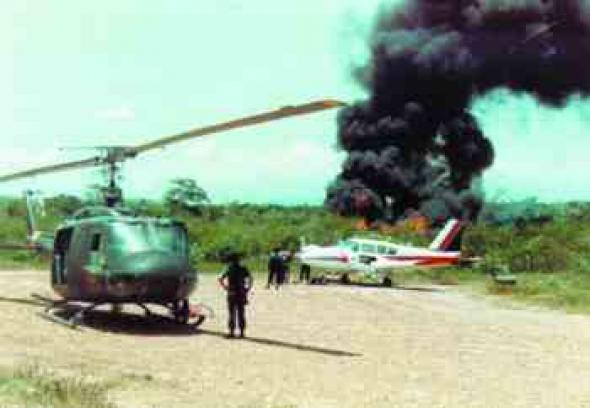The Real, Real Thing
While the US pours more military advisers and hardware into South America, new research indicates that the global cocaine business and its associated narco-terrorism have been fostered by one of its own multinationals. Peter Carty reports.
As the US dispatches more Black Hawk helicopter gunships to assist on the Colombian front of the global war on drugs and terror, academic research has come to light which implicates a leading US transnational in the growth of the cocaine business.
The research is being aired through an unusual outlet. One of the summer’s most popular paperbacks is set to be Dominic Streatfeild’s Cocaine (Virgin, £12.99), a doorstop of a book containing all the nose candy information you’ve ever wanted to sniff out. In among its 532 pages (detailing white powder history via the Incas-Freud-Prohibition-Cartels et al) is a small section detailing new and mind-blowing research about Coca-Cola by US historian Paul Gootenburg (Between Coca and Cocaine, Gootenburg, 2000) which implies that the beverage behemoth has helped to foster the global narcotics business.
It is a little known fact that Coca-Cola has run coca plantations in Peru for over a century. Its cultivation of the coca leaf continued after it stopped using cocaine as an ingredient during the early years of the twentieth century. Instead, it added an extract of the coca leaf from which the active narcotic alkaloids were removed. The practice continues: at the last count, New Jersey-based Coca-Cola subsidiary Stepan Chemicals was importing 175,000 kg of leaves annually.
The Federal Bureau of Narcotics has ensured that legislation banning the importation of coca leaves to the US has consistently exempted Coca-Cola. At the same time as it protected the business of a leading US company, the FBN took steps to discourage the rest of the Peruvian coca industry. As the options for legitimate cocaine makers narrowed through the 1930s and ’40s, the temptation to link up with Latin American criminal traffickers became overwhelming, and the black market trade grew through the 1950s and ’60s.
Gootenburg’s thesis hinges on circumstantial evidence, but is persuasive: it would be far from surprising if the existence of large-scale legitimate coca plantations to supply Coca-Cola has encouraged the continuation of sizeable illegitimate cultivation for use in the black market. Furthermore, Coca-Cola’s secret agricultural activities are likely to have affected neighbouring countries: much of the cocaine-base processed in Colombia originates in Peru and Bolivia.
Among the many ensuing ironies are that cocaine is now a much better globalisation case study than Coca-Cola. Refined production and distribution mean that cocaine is a uniform global product, while Coca-Cola is adapted to meet the requirement of domestic markets.
Gootenburg’s discoveries come after admissions by the CIA that it assisted Nicaraguan contras with cocaine imports to the US. As the flood of US military hardware and personnel into Colombia, Peru and Bolivia continues, consideration of the extent to which the superpower has fomented the drugs war and associated narco-terrorism would be timely.
Peter Carty <peter.carty AT tesco.net> is a writer and journalist
Mute Books Orders
For Mute Books distribution contact Anagram Books
contact@anagrambooks.com
For online purchases visit anagrambooks.com








